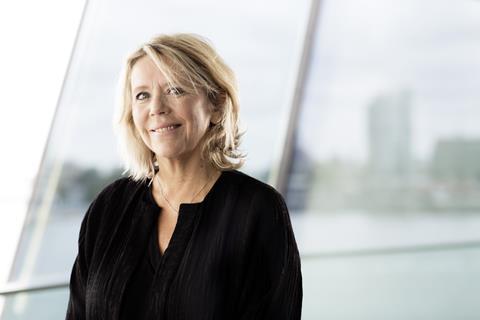
“We are on the way up,” a bullish Sandra den Hamer says of prospects for the Dutch film sector for 2025 and beyond. The chief executive office of the Netherlands Film Fund believes that the local film industry is at last moving forward after several difficult years in the wake of Covid, falling market share for local movies and the near invisibility of Dutch cinema at major international festivals.
Dutch films are performing better than many anticipated in 2024, growing market share to 17% from 14% the previous year. Comedy drama Loverboy: Emotions Off was the top performing local title with revenues of $4.5mn driven largely by younger cinemagoers.
Den Hamer is also encouraged by local titles breaking through, among them several art house films playing this week at International Film Festival Rotterdam. These include Aaron Rookus’s well received Big Screen competition contender Idyllic; Michiel ten Horn’s IFFR opener Fabula; Jan-Willem van Ewijk’s father and son drama Alpha, which premiered in Venice; and Mercedes Stalenhoef’s I Shall See in the Limelight section.
“Overall, the Dutch presence here in Rotterdam is quite good,” says den Hamer, a former IFFR artistic director and Eye Filmmuseum director. She also cites the recent Academy Award nominations for Dutch short films Wander To Wonder by Nina Gantz and I’m Not A Robot by Victoria Warmerdam as another cause for optimism.
Funding strategy
Den Harmer took over as the Fund’s CEO on an interim basis in April 2023 after Bero Beyer stepped down for health reasons. “I promised them [the board] to finish the new policy plan and guarantee a solid implementation in the first year of our new policy period. I am in the midst of doing that,” she says - but predicts there will be a new director in place at the Fund by 2026.

The Fund’s budget has now been confirmed for a new four-year funding cycle, 2025-2028. It has €89m to spend each year, with €66m dedicated to film (from development, production to distribution) and the remainder for high-end series, film festivals and film activities such as workshops and training.
“With a new government in power, the times are unstable, of course,” den Hamer acknowledges. Public broadcasters are already facing cuts, which could also affect the film and TV industries. She points out, though, that new Minister of Education, Culture and Science, Eppo Bruins, “is a very sensible person, highly valuing the cultural sector.” Proposals to increase VAT on museums, theatre and sports tickets from 9% to 21% have been headed off for now.
One part of the fund’s new strategy is to pump more money into fewer titles, thereby increasing production values and boosting the films’ profiles in the international market. This follows a 2023 report that concluded Dutch films are not performing to their fullest potential at the international box office.
For instance, Oscar winner Mike van Diem’s new feature For Our Girls has received €2.4m support from the Fund. There are strong hopes the feature, produced by Keplerfilm, will surface at a major festival later in the year. Also vying for festival selection later in 2025 is Mees Peijnenburg’s latest movie, A Family, which received €1.9m and is produced by Pupkin and stars Carice Van Houten; and Reedland by director/writer Sven Bresser, which is produced by Viking Film and received €1.5m. Martin Koolhoven, the director of Venice 2016 competition title Brimstone, is preparing to film his next film Emerald Butterfly and received €1.8m from the Fund.
The Fund has also re-introduced slate funding for leading independent production outfits. Kepler Film, Millstreet, Lemming Film and Docmakers were all among the beneficiaries of new two-year financial support for the development of new movies and series.
This spring, the Fund will also introduce a scheme to reward directors, producers and script writers. Filmmakers who have achieved “exceptional artistic and/or commercial success” with a previously released film supported by the Fund will be eligible for this special contribution. The grant can be invested freely in the development of a film or series of their choosing. In addition, successful producers who reached an above-average audience in the Netherlands with a film previously supported by the Fund may receive an additional contribution of up to €300,000 for a subsequent project.
Meanwhile, Den Hamer and her team are contemplating several other initiatives to boost the local production sector. These include the possibility of a national screenings event. The Netherlands Film Festival in September already provides a showcase for Dutch movies but there could be scope for something more industry focused.
The Fund can’t claim any direct involvement for the Venice and Golden Globes success of Dutch director Halina Reijn’s erotic thriller Babygirl, starring Nicole Kidman, but den Hamer points out that Reijn’s breakthrough feature Instinct was made with Dutch public support. “As a Dutch industry we can be so proud, Halina is such a strong talent. Babygirl is a huge success in the Netherlands, over 430,000 people have seen the film by now.”
However, the Fund itself is arguably becoming a victim of its own success. The 35% cash rebate system for film and high-end series is now becoming over-subscribed. It is regarded as an automatic support for any projects that fulfil the correct criteria. Now, though, some qualifying projects (mainly series) have had to be turned down because, with so many projects applying, the available budget reached its ceiling
“It’s not a situation that we are happy with,” Hamer states. “There is a big dependence on the incentive and a serious lack of alternative funding in the Netherlands and that is problematic.”

























No comments yet